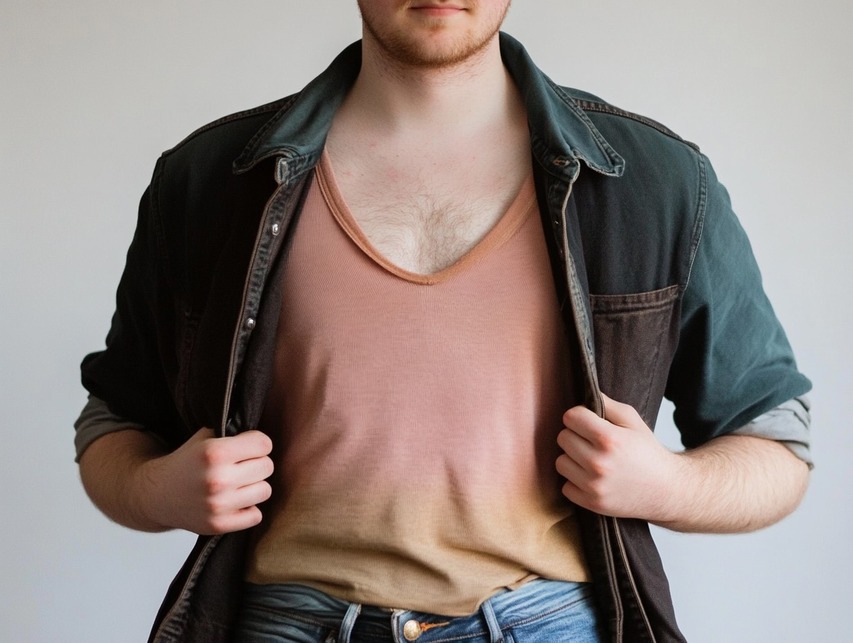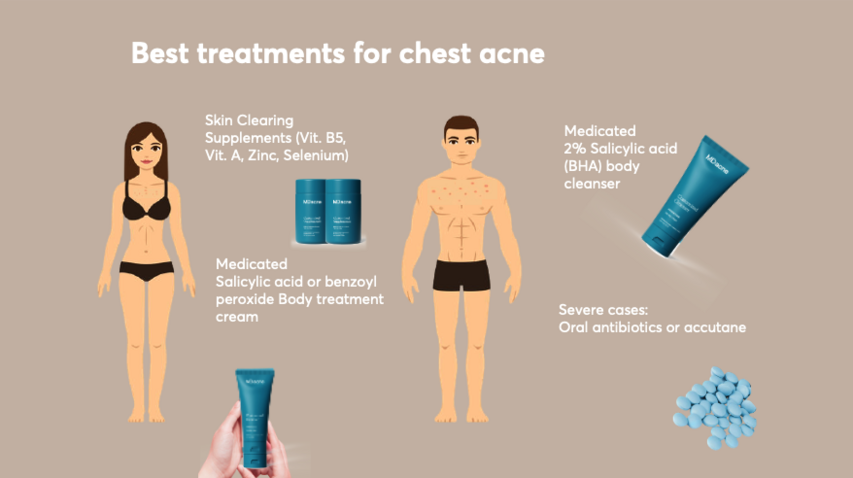Best treatments for chest acne - affordable and efficient

How to Treat and Prevent Chest Acne (and Other Body Acne)
Chest acne, back acne, and even buttock acne are common but frustrating problems. Like facial acne, body acne can leave behind scars that are difficult to treat, making prevention and proper care essential. Unfortunately, body acne often gets overlooked—but we’re here to change that!
Let’s dive into everything you need to know about chest acne: its causes, prevention tips, and effective treatments to help you achieve clearer, healthier skin.
What Are the Signs of Chest Acne?
Body acne most commonly shows up on the back, but over half of people with back acne also experience breakouts on their chest. The typical signs include blackheads, whiteheads, and inflamed pimples.
In more severe cases, chest acne can involve deep, painful cysts (called cystic acne) that may leave scars. If you’re noticing larger, tender bumps on your chest, it’s time to take action before they cause long-term damage.
What Causes Chest Acne?
The causes of chest acne differ from facial acne. While genetics and hormonal fluctuations play a role, external factors are the main triggers.
Here’s what commonly causes chest acne:
- Heat and humidity: Sweat and trapped moisture can clog pores, leading to breakouts.
- Tight, synthetic clothing: Fabrics like nylon or spandex can trap sweat and bacteria, irritating the skin.
- Steroids and bodybuilding hormones: These can stimulate oil glands and lead to acne flare-ups.
How to Prevent Chest Acne
Preventing chest acne starts with a few simple lifestyle changes. Here’s what you can do:
-
Shower Daily
Regular showers wash away bacteria, dead skin cells, and excess oil. Use lukewarm water (hot water can dry out and irritate your skin). -
Choose Loose, Breathable Clothing
Wear lightweight, breathable fabrics like cotton. Tight clothing or synthetic materials can trap sweat and irritate the skin, making acne worse. -
Wash Your Workout Clothes ASAP
Sweaty exercise clothes are a breeding ground for bacteria. Wash them immediately after workouts to prevent irritation from damp fabrics. -
Use Non-Comedogenic Body Lotion
Avoid oily or thick lotions that can clog pores. Opt for a non-comedogenic, oil-free moisturizer to keep your skin hydrated without causing breakouts. -
Switch to Gentle Laundry Detergents
Fragrance-free, hypoallergenic detergents are best for acne-prone skin. Some harsh detergents can leave residues that irritate the skin and contribute to breakouts. -
Watch Your Diet
While diet isn’t the sole cause of acne, studies show that high sugar intake, refined carbs, and dairy can increase the risk of breakouts. Stick to whole foods like fruits, vegetables, and lean proteins for healthier skin.

How to Treat Chest Acne
When prevention isn’t enough, the right treatment can make all the difference.
- Salicylic Acid Cleansers: Use a salicylic acid body wash to exfoliate dead skin cells and unclog pores. For maximum effectiveness, let the cleanser sit on your skin for at least 3 minutes before rinsing.
- Benzoyl Peroxide Creams: Apply a leave-on benzoyl peroxide cream at night to kill acne-causing bacteria and reduce inflammation. Look for formulations with microparticles for better penetration and less irritation (check out the MDacne Body Duo for both products).
Should You Use Retinoids on Chest Acne?
Unlike facial acne, chest acne can be more sensitive to retinoids, which may cause irritation on this area of the body. Stick to salicylic acid and benzoyl peroxide instead.
How to Treat Severe Chest Acne
Deep, painful cysts often require more than topical treatments. If you have persistent cystic acne on your chest, consult a dermatologist. They may recommend:
- Oral Antibiotics: To reduce bacteria and inflammation.
- Accutane: For severe, resistant cases of acne.
- Acne Supplements: Vitamins like pantothenic acid (B5) and vitamin A may help regulate oil production.
Can Sunscreen Cause Chest Acne?
Yes—using the wrong sunscreen can clog pores and trigger body acne. Choose an oil-free sunscreen formulated for acne-prone skin to protect your chest without breakouts.
Can Chest Acne Persist After Facial Acne Clears?
Absolutely. Body acne differs from facial acne in several ways:
- Larger pores: The pores on your chest and back are bigger and more prone to clogging.
- Thicker skin: Body skin is tougher, making it harder for treatments to penetrate.
- External triggers: Tight clothing and infrequent showers after sweating are common culprits for body acne.
Even if your facial acne clears up, you may need specific care to prevent body breakouts.
How to Fade Post-Acne Dark Spots on Your Chest
Dark spots left behind by acne (post-inflammatory hyperpigmentation) can be treated with a dark spot remover that contains:
- Alpha-Arbutin: A natural hydroquinone alternative.
- Bearberry and Licorice Extracts: Plant-based brighteners that fade discoloration.
Look for products specifically designed for dark spots to see the best results.
More info on body acne:
The best treatments for body acne
The best treatment for neck acne
Acne on the body, back, and buttocks - 7 best tips
To find the right acne treatments for your unique skin, take the free skin assessment by clicking here.



